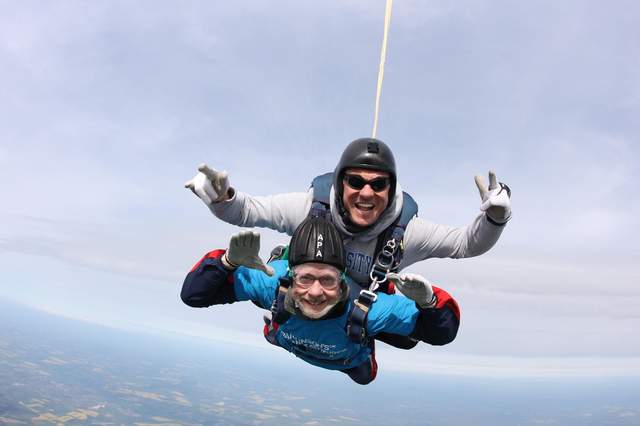A 74-year-old Buckingham man who has Parkinson’s is taking on a 15,000ft skydive in aid of Parkinson’s UK, according to Bucks Herald.
Anthony Houghton-Brown will be doing the skydive with his son Alastair, aged 46, and friend, Richard Dawson, 50, at Hinton-in-the-Hedges airfield on Saturday, September 17.
Anthony was diagnosed with Parkinson’s – a progressive condition affecting the brain – in 2006, and he said that the diagnosis has changed his life and forced him into early retirement from his job as a teacher.
About 145,000 people in the UK live with Parkinson’s and it is the fastest growing neurological condition in the world. Common symptoms include tremors, muscle stiffness and slowness of movement, but it can also cause fatigue, insomnia, anxiety and depression.
Since his diagnosis, Anthony has focused his efforts on becoming more physically and mentally active and raising vital funds for Parkinson’s UK, the charity that funds research into treatments for Parkinson’s and fights for fair treatment and better services.
To date, he has raised £26,000 from various fundraising challenges, including a 320ft abseil down the Spinnaker Tower in Portsmouth in 2018 and a skydive in Hampshire in 2014.
Anthony said: “I’m really hoping we can raise another £4,000 by taking on the skydive.
“This will take our fundraising total to £30,000, and all the proceeds will go towards funding Parkinson’s UK’s research.
“Parkinson’s research is vital to finding a cure for this condition that I have to live with every day.”
Parkinson’s UK is the largest European charitable funder of Parkinson’s research, and £30,000.00 would fund a clinical researcher for a year.
Regional fundraiser Katy Slade said: “We want to say a huge thank you to Anthony, Alastair, and Richard, for supporting Parkinson’s UK.
“Without our amazing fundraisers, the work we do just wouldn’t be possible.
“Together, we can drive forward pioneering research so we can develop better treatments and a cure for the condition.”
You can sponsor Anthony’s fundraising challenge here.
Image Source: Bucks Herald




